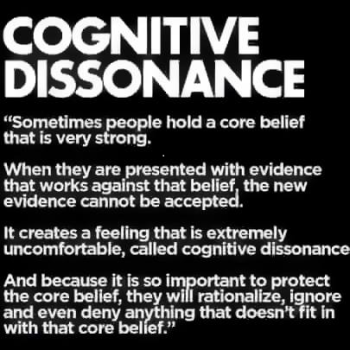It depends on the strength of certain core beliefs. Those who have closed hearts and closed minds have a distinct fear of the truth.
The Christian enthusiasm for the truth however is not shared by the secular world. In fact, its citizens, in general, harbor a distinct fear of the truth. This fear may be analyzed on three different levels:
1) that the truth would impose unwanted moral responsibilities on them;
2) that any association with the truth would occasion an air of pretentiousness;
3) that any claim to the truth might expose them to being wrong.
They prefer freedom from moral responsibility, absence of any “holier than thou” attitude and exemption from the possible embarrassment of being in error. Their fears, however, take them from the very light and meaning they long for, and plunge them into a dark void were they are trapped by a misery of their own making. Their flight from the truth is also an entrance into a world of gloom.
These three fears are ill fated, as well as ill founded.
First of all, truth is our only avenue to real freedom. “You shall know the truth and the truth shall set you free.” John 8:32
Ignorance may at times be blissful, but it is never illuminating. St. Augustine once remarked that he had met many people who had been deceived, but never met anyone who wanted to be deceived.
We have a natural hunger for the truth of things. No one ever asks for the
wrong time. It is always the “right” time and the truth about things we want to learn. Untruth is not helpful, but truth is like a beacon that shows us the way. This is why the Pope titled his great encyclical on the freeing function of truth as
Veritas Splendor (Truth’s Splendor).
When we are lost we want to learn the truth about our situation so that we can be liberated from our confusion. The truth makes us free; untruth binds us to bewilderment. The truth about ourselves awakens us to our moral responsibilities, but we need this awakening in order to become whom we truly are, to advance toward our destiny, to build a meaningful life. We should welcome the truth that illuminates our moral responsibilities with the same enthusiasm that a person who is lost in the woods and welcomes a compass and a map.
Secondly, the fear that any discovery of truth would make us pretentious is also counterproductive. Truth is not of our own making. Even Christ proclaimed that the truth He illuminated did not spring from Him alone. “My teaching is not mine, but His who sent me” (John 17:6)
Truth is not subjective. It represents the objective order of things. The person who comes to know something of the truth, then should experience humility, not vanity,
for he discovers something that is not his.
Christ was emphatic in his denunciation of the Pharisees who claimed to know something of the truth but behaved with a pretentious snobbery. Truth is not he cause of Pharisaism, vanity is.
And both Christ and his Church are unrelenting in their advocacy of humility and in their condemnation of vanity. In fact, it may be far less tolerant of Pharisaism than the secular world. Consider, for example, the comment, “I hate anything fake,” made by Britney Spears, a veritable icon of artificiality and pretense. The secular world awards this kind of duplicity with celebrity.
Thirdly, there is the rather spineless fear that in perusing the truth, we might fall into the embarrassing predicament of being wrong. Again, there is nothing wrong that can reasonably justify this anxiety. We all make mistakes. Not to try something for fear of making a mistake is akin to a paralyzing neurosis that would discourage one from trying anything.
Some people avoid marriage because they fear divorce. Others avoid friendship because they fear rejection. The pursuit of truth presupposes a certain amount of courage. If nothing is ventured, as the maxim goes, nothing is gained.
We have a natural hunger for the truth of things. No one ever asks for the
wrong time. It is always the “right” time and the truth about things we want to learn. Untruth is not helpful, but truth is like a beacon that shows us the way. This is why the Pope titled his great encyclical on the freeing function of truth as
Veritas Splendor (Truth’s Splendor).
When we are lost we want to learn the truth about our situation so that we can be liberated from our confusion. The truth makes us free; untruth binds us to bewilderment. Continued...

ehrmanblog.org





